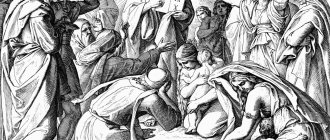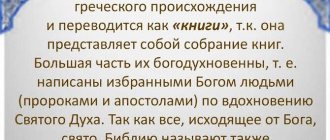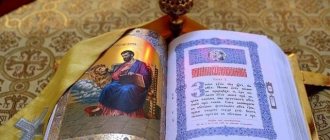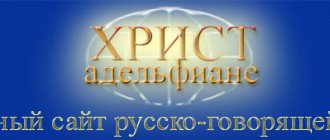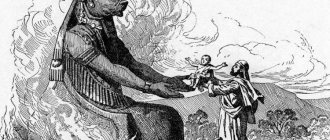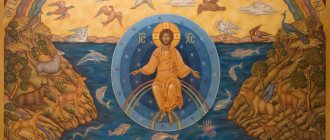Holy Orthodox books are a kind of compass for the spiritual advancement of Christians in knowledge of the will of God. The Bible is the Holy Scripture given by the Creator to humanity. The historical merits of the texts of the Holy Scriptures lie in the fact that they were written by specific people who lived at a certain time, according to the knowledge bestowed by the Almighty Himself.
Great prophets, who had the gift of communicating with God, wrote down messages to humanity to show concrete examples of the reality and power of the Lord.
Apostle John the Theologian
What the Bible Includes
The Bible includes 66 books:
- 39 messages of the Old Testament;
- 27 books of the New Testament.
These books are the basis of the biblical canon. Holy books in Orthodoxy are inspired by God, for they were written under the guidance of the Holy Spirit. The Bible is a must-read and study for every Christian.
In the Bible, Holy Scripture, the creator said “Do not be afraid!” 365 times. and the same number of “Rejoice!” The great promise from the Creator is given to thank the Creator every day, constantly being in joy.
Only by understanding the texts of the Holy Scriptures and finding confirmation in the stories of the saints can one learn what and how to rejoice and what to thank God for. Without knowing the origins of the creation of the world, it is impossible to fully believe in the reality of the events taking place in the New Testament.
About the Bible:
- 15 Interesting Facts About the Bible
- Who is Judas Iscariot in the Bible
- Epistle to the Galatians by St. Paul the Apostle
About Sacred Tradition
Speaking about the Holy Scriptures, we should not forget about another way of disseminating divine revelation - Holy Tradition. It was through him that the doctrine of faith was transmitted in ancient times. This method of transmission exists to this day, for under Sacred Tradition is conceived the transmission not only of teaching, but also of sacraments, sacred rites, and the Law of God from ancestors who correctly worship God to the same descendants.
In the twentieth century, there was some change in the balance of views on the role of these sources of divine revelation. In this regard, Elder Silouan says that Tradition covers the entire life of the church. Therefore, that very Holy Scripture is one of its forms. The meaning of each of the sources is not contrasted here, but the special role of Tradition is only emphasized.
Why should an Orthodox believer read the Old Testament?
The Old Testament begins with the basics, a description of events from the creation of the world to 400 before the coming of Jesus Christ to earth. The Pentateuch (first 5 books) or Torah in Hebrew was written by the prophet Moses.
Prophet Moses
The first book of Genesis describes a long period from the first man, the global flood, God's creation of His Jewish people, the birth of Isaac, Jacob, the entry into Egypt and the exit from it after 400 years. Some people wonder how humanity learned about Adam if there was a global flood. The answer is found in the Holy Scripture itself, if you read it carefully, making sure to pray to the Almighty.
The Jews have preserved a good rule, coming from the first people, to know their ancestors up to the 14th generation. Noah's grandfather was still alive during Adam's last days. Of course, the little boy heard the story of the creation of the earth and the first people more than once, and then Noah passed it on to his sons. This is how you can historically prove the righteousness of every message conveyed by God to humanity through the prophets.
For 1500 years, from Abraham, the first Jew on earth, to Malachi, through life circumstances, God appeared to kings and shepherds, prophets and priests, warriors and judges.
An amazing fact is that the biblical sacred texts written at different times by different people are consistent with each other and seem to be a continuation and addition of one another.
Exodus shows God's care for His people, who wandered in the desert for 40 years because of murmuring, but at the same time the Creator did not leave the Jews without His guidance for a moment.
The Jews moved through the desert under the guidance of a pillar, which was dusty during the day and fiery at night. It was the Holy Spirit who led God's people out of slavery. In the desert, on Mount Sinai, God gave his 10 commandments, which became the basis of all Christianity, law and guide.
Ten Commandments (tablets)
Based on historical facts, it is easy to trace the prototype of Jesus Christ, for example, at the moment when the people were attacked by snakes, the one who kept his gaze on the staff of Moses was saved, and Orthodox people will never perish if they constantly look at Christ.
The laws of blessing and cursing are recorded in Deuteronomy. A faithful God always does what he promises. (Deuteronomy 28)
The books of the Prophets describe the development of the Jewish people, their reign, and prophecies about the birth of the Messiah run through them as a red thread. Reading the book of the prophet Isaiah, one cannot shake the feeling of unreality, because he lived almost 600 years before the coming and death of Jesus, and he described in detail the birth of Christ, the killing of infants, and the crucifixion.
In chapter 42, through Isaiah, God makes a promise to always be there for His faithful children.
The 12 books of the minor prophets show the real communication of mortal people, faithful to God with their whole lives, with the Creator. They knew how to hear the Creator and were obedient in fulfilling His commands. Through faithful prophets, God spoke to the world.
King David was faithful to the Lord, for which he was awarded the title of a man after God's heart. Psalms, recorded from the songs of David and the prophets, formed the basis of many prayers. Every Orthodox Christian knows that in times of trial, Psalms 22, 50, 90 help to overcome fear and feel the Protection of God.
King David
Solomon was not David's eldest son, but it was him who the Creator chose to be king. Because Solomon did not ask God for wealth and glory, but only wisdom, the Creator granted him the richest reign on earth.
Psalms of David:
- Psalm of David 22
- Psalm of David 50
- Psalm of David 90
Ask God for wisdom so that your earthly life will be filled with completeness:
- God's knowledge;
- fear of the Savior;
- family happiness;
- children's laughter;
- wealth;
- health.
The books of Daniel, Malachi, Ezra carry encrypted messages to humanity until the end of earthly existence; they echo the Revelation of John from the New Testament. After Malachi there is no record of God's messages.
For 400 years before the birth of Jesus, the Creator was silent, observing the observance of His laws by the chosen people.
Humanity at that time represented many peoples, they had their own gods, worship, rituals, which in the eyes of the Creator was an abomination.
Seeing the hardened hearts of the world's population, who try to earn forgiveness of sins by killing animals as sacrifices, God sends His Son, Jesus Christ, to the people. The Savior became the final sacrifice, for everyone who believes in Him will be saved. (John 10:9)
Jewish Scripture
We should start with the scripture that is closest in content and origin to the Bible - the Jewish Tanakh. It is believed that the composition of the books here practically corresponds to the Old Testament. However, there is a slight difference in their location. According to the Jewish canon, the Tanakh consists of 24 books, which are divided into three groups. The criterion here is the genre of presentation and the period of writing.
The first is the Torah, or, as it is also called, the Pentateuch of Moses from the Old Testament.
The second is Neviim, translated as “prophets” and includes eight books covering the period from the arrival of the promised land to the Babylonian captivity of the so-called period of prophecy. There is also a certain gradation here. There are early and late prophets, the latter are divided into small and large.
The third is Ketuvim, literally translated as “records.” Here, in fact, the scriptures are contained, including eleven books.
The New Testament - A Guide to Living with Christ
With the birth of the Savior, a new era in the history of mankind begins. The New Testament describes the main stages of Christ's stay on earth:
- conception;
- birth;
- life;
- miracles;
- death;
- resurrection;
- Ascension.
Jesus Christ is the heart of the entire Bible. There is no other way to gain eternal life except by faith in the Savior, for Jesus Himself called Himself the Way, the Truth and the Life (John 14).
Each of the twelve apostles left a message to the world. Only four Gospels included in the New Testament are recognized as inspired and canonical.
Twelve disciples of Jesus Christ
The New Testament begins with the Gospels, the Good News conveyed through ordinary people who later became apostles. The Sermon on the Mount, known to all Christians, teaches believers how to become blessed in order to acquire the kingdom of God already on earth.
Only John was among the disciples who were constantly near the Teacher. Luke at one time healed people; all the information conveyed to him was collected during the time of Paul, after the crucifixion of the Savior. This message reflects the researcher's approach to historical events. Matthew was chosen as one of the 12 apostles instead of the traitor Judas Iscariot.
Important! Epistles that are not included in the New Testament due to doubts about their authenticity are called apocryphal. The most famous of them are the Gospels of Judas, Thomas, Mary Magdalene and others.
In the “Acts of the Holy Apostles,” transmitted by the Apostle Paul, who never saw Jesus the man, but who was given the grace to hear and see the bright Light of the Son of God, the life of Christians after the resurrection of Christ is described. The teaching books of the New Testament contain the messages of the apostles to specific people and entire churches.
By studying the Word of God, transmitted by His disciples, Orthodox people see before themselves an example to follow, to be transformed into the image of the Savior. Paul's first letter to the Corinthians contains a hymn of love (1 Cor. 13:4-8), reading each point of which you truly begin to understand what God's love is.
In Galatians 5:19-23, the Apostle Paul offers a test by which every Orthodox believer can determine whether he is walking according to the flesh or according to the spirit.
The Apostle James showed the power of the word and the unbridled tongue through which both blessing and curse flow.
The New Testament ends with the book of Revelations of the Apostle John, the only one of all twelve disciples of Jesus who died a natural death. At the age of 80, for his worship of Christ, John was created on the island of Patmos for hard work, from where he was transferred to heaven to receive Revelation for humanity.
Attention! Revelation is the most difficult book to understand, its messages are revealed to selected Christians who have a personal relationship with the Holy Trinity.
Revelation of Saint John the Theologian
Modern translations of the Holy Scriptures
A teaching of such magnitude as the Bible attracts the attention of a huge number of people. Humanity's need for it is undeniable. However, at the same time, there is a danger of inaccurate or deliberately distorted translation. In this case, the authors can promote any of their interests and pursue their own goals.
It should be noted that any translation of the Holy Scriptures existing in the modern world has been subject to criticism. Its validity was confirmed or refuted by the strictest judge - time.
Today, one of these widely discussed Bible translation projects is the New World Scripture. The author of the publication is the religious organization Jehovah's Witnesses. In this version of the presentation of the Holy Scriptures there is much that is new and unusual for admirers, people who truly believe and know it:
- some well-known words have disappeared;
- new ones appeared that were not in the original;
- the authors abuse paraphrase and actively add their own interlinear comments.
Without entering into the controversy created around this work, it should be noted that it can be read, but preferably accompanied by the synodal translation accepted in Russia.
